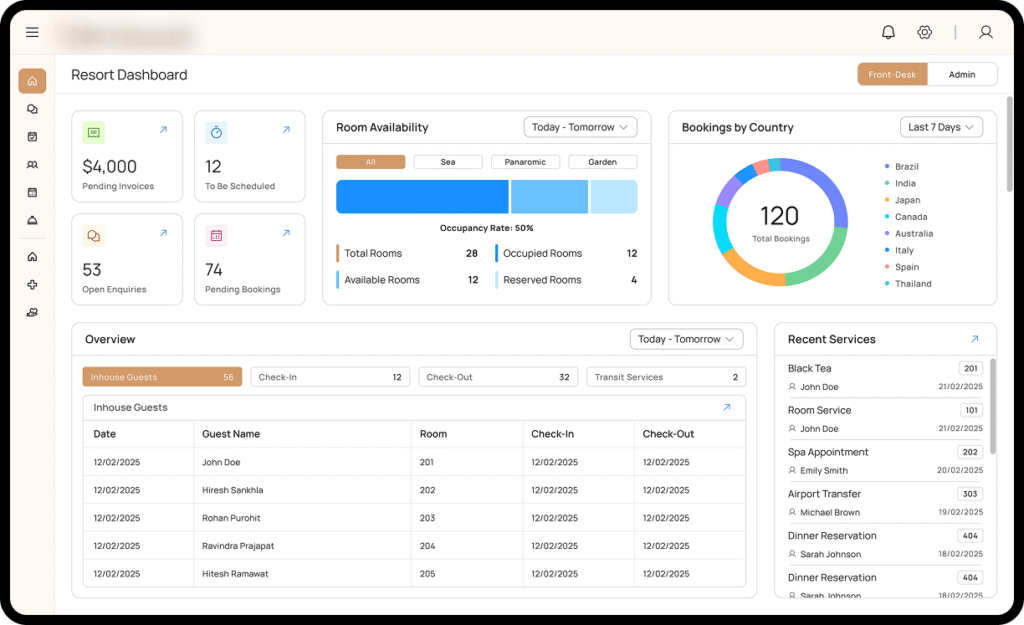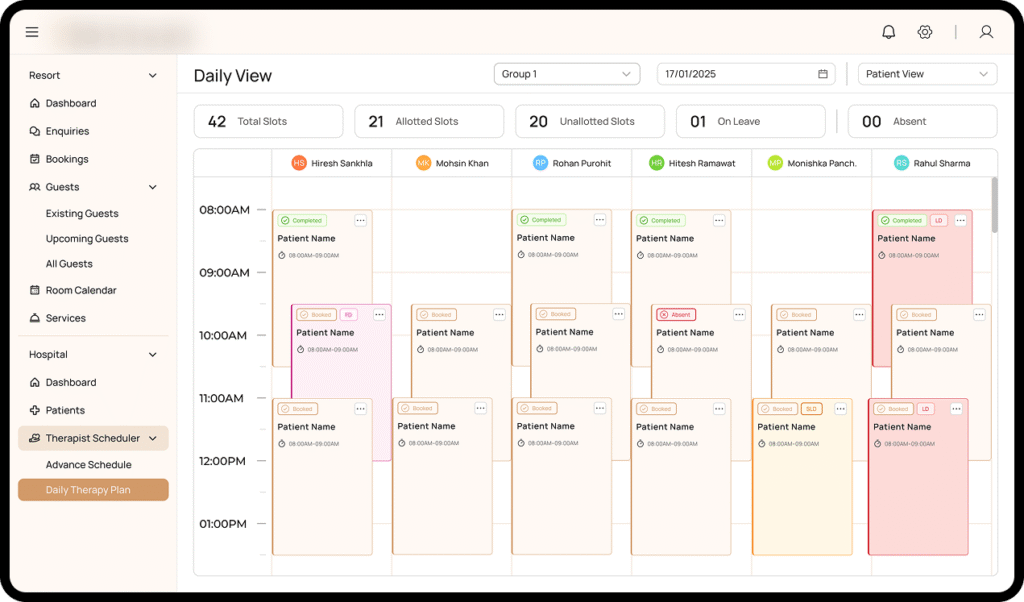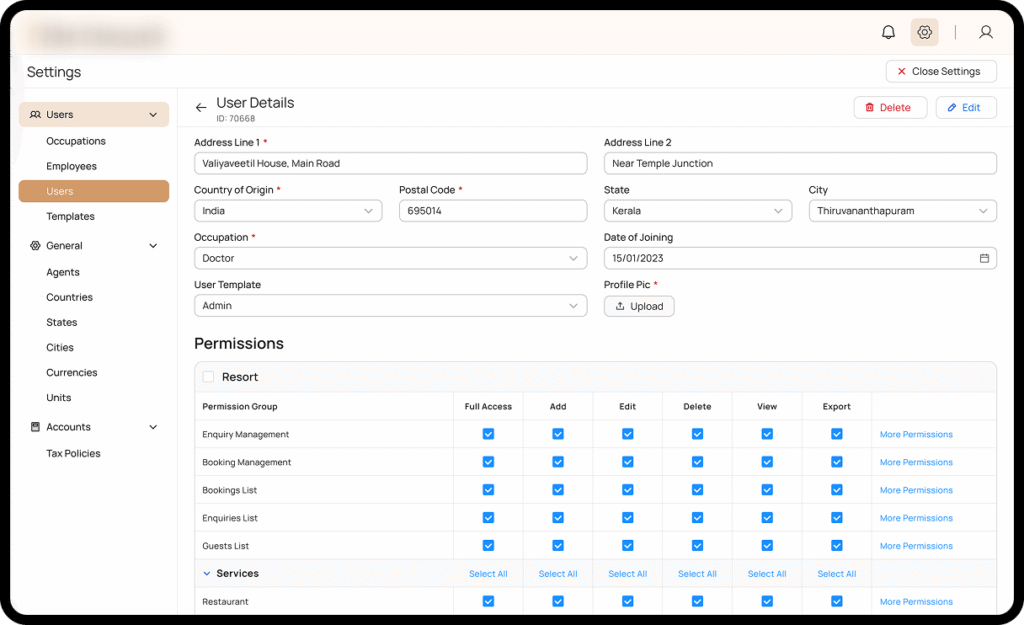Ayurvedic Resort & Hospital Management System
UI & interaction designer
Duration: 3 months
Team: 1 fellow designer, 2 frontend and 2 backend developers, 2 business analysts and 2 QA testers, 1 project manager
I designed a comprehensive web-based management system for an Ayurvedic center that operates both a resort and hospital. The project focused on digitalizing their manual processes while creating a scalable solution that could be adapted for other hospitality and healthcare businesses.

The Problem
Managing both a resort and a hospital under a single system was challenging for the Ayurvedic center. The existing workflow relied on manual processes, disconnected systems, and inefficient coordination between departments.
Key Pain Points:
- Manual booking and scheduling processes leading to double bookings
- Disconnected patient records and therapy schedules
- No centralized communication between resort and hospital staff
- Increased chances of errors and miscommunication
- Time-consuming administrative tasks
Goals
Business Goals
- Digitalize manual processes to reduce operational workload
- Create a unified system that eliminates data silos
- Develop a scalable product that can be sold to other hospitality + healthcare businesses
- Reduce administrative errors and improve staff efficiency
User Goals
- Streamline daily workflows for all staff members
- Provide easy access to guest/patient information
- Simplify booking and scheduling processes
- Enable better coordination between departments
User Types & Roles
🏨 Receptionists
- Manage guest check-ins/check-outs
- Handle room bookings and availability
- Schedule treatments and therapies
- Coordinate with hospital for patient transfers
👨⚕️ Doctors
- Access patient medical records
- Write daily treatment for patients
- Manage & Schedule treatments and therapies
- Track patient progress and treatment plans
👔 Managers/Admins
- Oversee both resort and hospital operations
- Generate reports and analytics
- Manage staff and resources
💰 Accountants
- Handle billing for both resort and hospital services
- Generate financial reports
- Manage payment processing
Design Process
Requirement Gathering
Collaborated with business analyst to understand client needs, existing workflows, and technical constraints. Identified the unique challenge of combining two different business models.
Secondary Research & Mood Board
Analyzed existing hospitality and healthcare management systems to understand best practices and identify opportunities for innovation.
Information Architecture & User Flows
Created a modular IA that separated resort and hospital functions while allowing seamless data sharing. Designed user flows for each role type.
High-Fidelity Prototype
Developed comprehensive UI designs focusing on scalability and user experience across different user types.
Feedback & Iteration
Regular feedback sessions with project manager and client to refine the design and ensure it met business requirements.
Key Features & Screens

Resort Dashboard
Centralized view of room availability, guest information, and daily operations with clear separation from hospital functions.

Guest Profile Management
Comprehensive guest profiles that can seamlessly convert to patient records when needed, maintaining data integrity while keeping systems flexible.

Therapies Calendar
Separate views for patients and therapists to manage treatment schedules, showing the same information optimized for different use cases.

Robust User Management
Granular permission system allowing admins to control access to resort, hospital, or settings sections based on user roles.
Outcome
Client Feedback: “This is going to be so helpful in managing and decreasing our workload” – Client during final presentation
The prototype successfully demonstrated how digital transformation could streamline operations for the Ayurvedic center. The client approved the design direction and moved forward with development.
Key Achievements:
- Created a unified system that maintains separation between resort and hospital operations
- Designed scalable architecture suitable for other hospitality + healthcare businesses
- Successfully led design team and delivered within 3-month timeline
Challenges & Takeaway
🎯 Scalability Challenge
Problem: Design for one specific client while keeping the system flexible for other businesses.
Solution: Implemented modular design thinking:
- Separated resort and hospital sections in navigation for businesses that might only need one
- Kept guest and patient records separate but with easy data transfer for combined operations
- Created granular permission system that adapts to different business models
👥 Multi-User Complexity
Challenge: Managing 4 different user types with varying permission levels and workflows.
Takeaway: The importance of role-based design and comprehensive user management systems in complex applications.
🤝 Team Leadership
Challenge: Leading another designer while managing my own design workload under tight timeline.
Takeaway: Learned the value of clear communication, task delegation, and collaborative design processes.
🔄 Design Without Traditional Research
Challenge: Creating user-focused design without formal user research.
Takeaway: Requirement gathering and stakeholder insights can provide valuable user understanding, though traditional research methods would have strengthened the foundation.
Prototype
CineSnacks
NEXT PROJECT